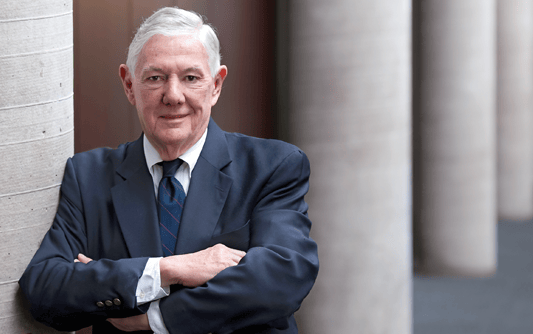 John “Jack” Smith, W’51, WG’52, worked in sales and in market development. He was an officer in the U.S. Navy and an entrepreneur with his own executive search firm, The Penn Partners. He was an executive too—first vice president of marketing, then president, followed by chairman of the board at Modern Group Ltd., a materials-handling firm out of Bristol, PA. Now chairman, retired, he makes his way into the office at least three times a week. A gardener and golfer, grandfather and great-grandfather, Smith is also leading the charge with the Wharton Graduate Emeritus Steering Committee.
John “Jack” Smith, W’51, WG’52, worked in sales and in market development. He was an officer in the U.S. Navy and an entrepreneur with his own executive search firm, The Penn Partners. He was an executive too—first vice president of marketing, then president, followed by chairman of the board at Modern Group Ltd., a materials-handling firm out of Bristol, PA. Now chairman, retired, he makes his way into the office at least three times a week. A gardener and golfer, grandfather and great-grandfather, Smith is also leading the charge with the Wharton Graduate Emeritus Steering Committee.
WHARTON MAGAZINE: What would you say has been your biggest impact in the business world or in your community?
JACK SMITH: Why don’t we take Modern because I’ve been there now since ’89. I think the role I played in the transition from an owner/founder to a broader professional management team, taking over the management and then taking over the running of an ESOP [employee share ownership plan] company, has been very interesting and it’s been challenging. Fortunately, even though the marketplace is a little tough at the present moment and has been for a couple of years, we’ve been successful.
WM: What in particular did you learn in a classroom at Wharton that is still valuable to you today?
SMITH: I was a Wharton graduate only one year, and in the second half of the year, a new cost accounting program opened up. I asked the dean of the marketing department: Could I switch to his course? He taught it, and he let me do it. And that was a course of study that I’ve used in my whole business career, understanding the financial end of businesses.
WM: Is there a moment from your varied career that you are particularly proud of?
SMITH: I’ll answer that question from a funny angle. When I was with Gould and general manager of their automotive battery manufacturing business, we submitted a quote to build a maintenance-free battery plant for the Iranian army, when that government was controlled by the Shah.
I’ve always claimed that I lost the bid because, when I was asked a question by the secretary of war, a five-star Iranian air force general, about some political comments, I assured him that there was no room and no money in our budget for briber. I think that’s what lost me the deal, right when I told him that.
Losing it was very fortunate. Three months after the contract was given to a German battery outfit, the Shah of Iran was overthrown. I would have had close to a dozen men in Iran at that time, and I was awfully glad they weren’t there. So it was a good contract to lose.
WM: How was your Navy experience?
SMITH: I’d recommend any young man or woman, getting out of college, to do that nowadays, that they consider going into the military as part of their education and training.
WM: If you had one piece of advice for fellow alumni, those currently in the middle of a successful, busy career, what would it be?
SMITH: Try to develop enough time in your schedule to participate with your family and with your community, including the University. For those who don’t live around Philadelphia, there are so many alumni clubs and groups throughout the country and, in fact, throughout the world.
WM: Will you ever truly retire?
SMITH: A lot of people ask me that. The only one who understands me is my wife. She says it’s good for you to go out three days. Yes, I will retire, but I principally now spend time with significant customers and new customers, helping salesmen get established and building that relationship to a very strong, ongoing operation.
WM: If you do retire, do you have any hobbies or outside pursuits that you really would dive into?
SMITH: Well, I still play golf and tennis, and I would hope to continue those. I gave up squash last year. I like gardening, but we’ve just moved from our home to a retirement village, so my gardening will be less. But I would hope to develop some participation with nonprofits where I can add something.
WM: Your favorite vegetable to grow?
SMITH: I guess potatoes might be. I usually grow a crop of two or three different types of potatoes.
WM: What is it about the Wharton Graduate Emeritus Steering Committee that makes you work so hard to promote it?
SMITH: The idea of trying to get together the senior alumni—my term, instead of the “old guys”—is that they have a lot of experience, a lot of exposure. If we can develop the right process, we will be able to bring that experience to the younger MBA students and alumni so it would be helpful for both. That’s what I’m trying to do.

























